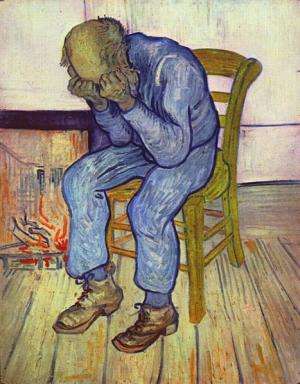December 10, 2013 report
Slowdown of emotional recovery could be a warning sign for depression

(Medical Xpress)—Depression is a serious health problem that reduces the individual's quality life and creates a societal burden because of medical costs and decreased work productivity. Unfortunately, the transition from a normal to a severely depressed state can appear to occur suddenly, so observers cannot predict when someone is likely to become depressed. In a study published in the Proceedings of the National Academy of Sciences, Martin Scheffer of Wageningen University in the Netherlands and his colleagues have found that before people become severely depressed, they find it harder to bounce back from negative emotions. A reduction in resilience when encountering emotional setbacks can be a warning of a depressive episode.
Between 10 and 20 percent of the population will experience at least one episode of major depressive disorder (MDD), the most severe form of depression, in their lifetimes. The ability to predict when someone is likely to succumb to MDD would benefit the individual and society. Although there are factors, such as genetics, that can increase the risk of depression in an individual, it is hard to tell when someone is about to move from a mentally healthy to a depressed state.
To understand what propels people into depressive episodes, Scheffer's team considered the concept of the "tipping point"—the critical moment when a system undergoes an abrupt, irreversible change in state. Researchers attempt to predict changes in ecological and social systems by looking for tipping points. The ability to identify a tipping point for MDD could enable health professionals to take preventive measures.
Just before it reaches a tipping point, a system often undergoes a period of "critical slowing down," when it becomes harder to recover from disturbances. To determine whether such a period occurs before the onset of MDD, the team had more than 600 volunteers, some of whom were mentally healthy and some who had been diagnosed with depression, record their emotions over a period of five or six days. Each of the volunteers wore a watch that beeped at a random time, 10 times a day, within 90 minute time blocks. When the watch beeped, the volunteers had to fill out an emotional self-assessment.
The team looked at four emotions: cheerfulness, contentedness, anxiety and sadness. They found that volunteers who took longer to recover from negative emotions were more likely to experience an increase in depressive symptoms and more likely to develop MDD. Volunteers who took longer to transition from positive to negative emotions tended to become less depressed. Scheffer's team suggests that monitoring mood data, for example, by using a smartphone app, can help prevent depression from worsening.
More information: Critical slowing down as early warning for the onset and termination of depression, Published online before print December 9, 2013, DOI: 10.1073/pnas.1312114110
Abstract
About 17% of humanity goes through an episode of major depression at some point in their lifetime. Despite the enormous societal costs of this incapacitating disorder, it is largely unknown how the likelihood of falling into a depressive episode can be assessed. Here, we show for a large group of healthy individuals and patients that the probability of an upcoming shift between a depressed and a normal state is related to elevated temporal autocorrelation, variance, and correlation between emotions in fluctuations of autorecorded emotions. These are indicators of the general phenomenon of critical slowing down, which is expected to occur when a system approaches a tipping point. Our results support the hypothesis that mood may have alternative stable states separated by tipping points, and suggest an approach for assessing the likelihood of transitions into and out of depression.
© 2013 Medical Xpress














